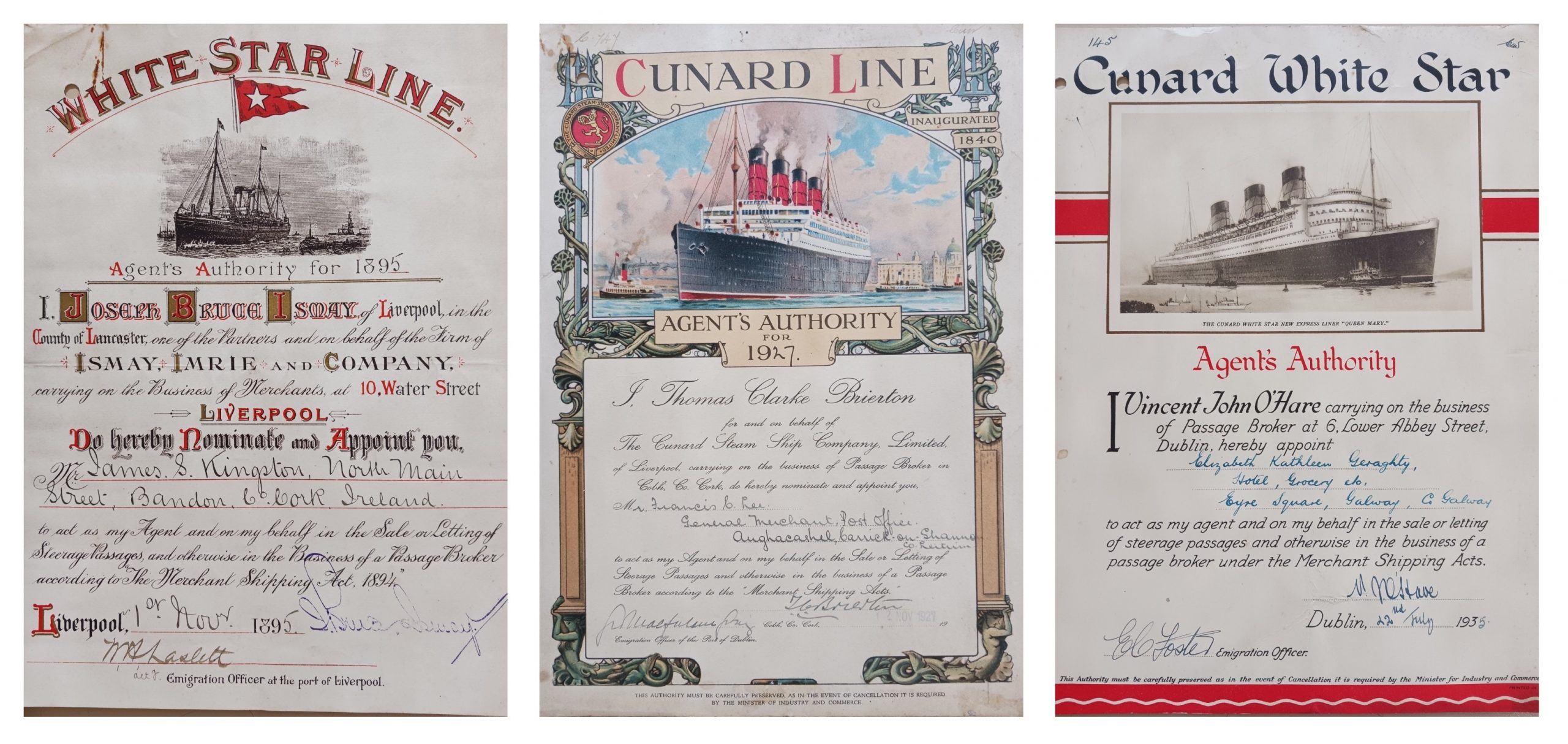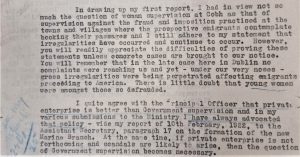File in Focus: Unscrupulous ticket agents – emigration in the early 20th century
23.04.20 Document of the month Online exhibitions

Passage agents’ licenses also functioned as advertisements (NAI 2022/29/20 and 24)
This file in focus has the title ‘Emigration matters 1925-1926’ (2022/29/1) and deals with emigrant ships being surveyed for seaworthiness, with vessel clearances (when a vessel, its third-class passengers and its medical supplies were checked before departure), and with the registration of passage agents and ‘emigrant runners’. The series it belongs to was created by the Emigration Office as part of the Department of Industry and Commerce, and came from today’s Marine Survey Office (Department of Transport).
Passage agents were usually small business owners, including publicans, who sold tickets for particular shipping lines. Emigrant runners worked for proprietors of lodging houses, shops and public houses in port towns and solicited intending emigrants to use those establishments before embarkation. Both agents and runners were licensed by district judges, but there was potential of people planning to emigrate being defrauded or taken advantage of.
The most interesting correspondence is that of March 1925 between the Chief Surveyor and Emigration Officer Captain MH Clarke, the Senior Engineer Surveyor George McFarlane Gray, and Principal Officer Michael Deegan, Transport and Marine Branch, Industry and Commerce. It reflects on bad practices among passage agents and discusses how women unused to travelling could be exploited. Gray reported that:
“I think the weak spot in the organisation of the business is the [Passage] Agent. It is, I am afraid, too much to expect all these men to place their humanitarian before their business interests.” (7 March)
He recommended an investigation into the methods used by Irish passage agents.

Barbed compliment for the Canadian handling of emigrants: Senior Engineer Surveyor, Cork to Chief Surveyor, Dublin (7 March 1925) (NAI 2022/29/1)
Clarke reported this to the Principal Officer at the Ministry, adding detail about how passage agents at times tried to take more money off emigrants than the authorised legal fare, and about how unsuspecting women arriving in ports could be taken advantage of (9 March). He argues against giving licences to public houses: in a village where it is known that a relative sent more than the ticket cost, the publican-agent uses “all sorts of devices…to obtain more than the authorised fare”.
Where the question of women emigrants is concerned, Clarke met representatives of charities in Dublin who were interested in the welfare of women and children: the International Catholic Girls’ Protection Society (ICGPS), the Girls’ Friendly Society (Protestant), the Catholic Rescue Society, and the Saint Vincent de Paul Society.
The ICGPS’s manager, Miss O’Donoghue told Clarke that women coming from the west of Ireland “[needed] protection and were subject to the activities of unscrupulous agents, harpies, etc.” According to her, the ICGPS’s officers attempted to assist girls arriving at the railway station, inviting them to their hostels, but were in competition with boarding house and hotel keepers
who manage to inveigle them to their houses and, of course, away from the good influence of the Society. These young women were frequently found afterwards in dancing saloons and other objectionable places.
Similar to Gray, Clarke also recommended a better supervision of the agents, and a reduction in their number.

Chief Surveyor to Principal Officer, Transport and Marine Branch (9 March 1925) (NAI 2022/29/1)
Officials were also attempting to decide whether ‘emigrants’ was an outdated description for third-class or steerage passengers. A memorandum of 16 October 1925 mentions that the United States Lines and others were beginning to set up tourist traffic: “a new class of Americans of moderate means was most anxious to visit these countries and Europe”, and it was argued that such travellers ought not to be subjected to medical assessments before departing again.
The series as a whole also includes a couple of registers giving figures for departing emigrants, some random passenger lists 1933-1942 including one for the All Catholic Cruise to the Mediterranean on the Twin Screw Steamer ‘Tuscania’ in 1935 (2022/29/6), reports from medical officers, and about 280 cancelled licences for a number of shipping lines (1895 – 1959). Licenses were printed on cardboard, to be hung up in the agents’ shops and bars – please see some samples above.
The papers can be accessed in the Reading Room: see the Department of Transport finding aid for a complete list of the files (2022/29).
Vera Moynes, Archivist